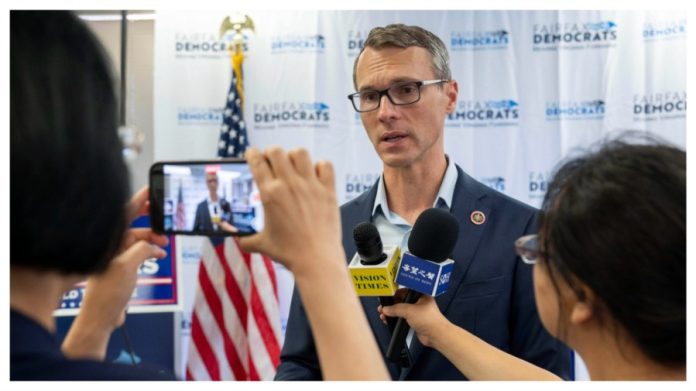
Democrats scored a win in the race to replace the late Rep. Gerry Connolly (D-Va.) in Virginia’s 11th Congressional District, narrowing the Republican majority in the House of Representatives.
Fairfax County Supervisor James Walkinshaw (D) handily defeated Republican Stewart Whitson, a former FBI agent, in the heavily Democratic-leaning district on Tuesday. The race offered some insight on what to watch out for ahead the state’s gubernatorial elections in November.
Additionally, Boston held its nonpartisan mayoral primary, setting up a November showdown between incumbent Mayor Michelle Wu (D) and nonprofit executive Josh Kraft, who is the son of New England Patriots own Robert Kraft.
Here are key takeaways from Tuesday’s special elections:
House Republican majority narrows
While Walkinshaw’s victory is no surprise, it’s notable because it will impact the Republican majority in the House of Representatives. Connolly’s seat was one of three Democratic vacancies, leaving Republicans with a 219-212 majority.
Those vacancies have likely helped Republicans during crucial votes this year, including the vote to pass the GOP spending megabill, also known as President Trump’s “big, beautiful bill,” in May. That legislation passed by just one vote.
However, Walkinshaw’s victory will narrow the GOP majority to 219-213 once he’s sworn in, meaning Johnson will only be able to lose two votes from his conference. Johnson and House Republicans are already grappling with an upcoming government funding deadline.
The remaining two Democratic vacancies in the House are the seats held by the late Reps. Sylvester Turner (D-Texas) and Raul Grijalva (D-Ariz.), who both passed away earlier this year. Former Rep. Mark Green (R-Tenn.) resigned earlier this year, leaving Republicans with one vacancy.
Democrats add to their special election streak
While Democrats have struggled to unify during the first year of Trump’s second administration, the party has seen a number of special election wins across the country.
Like in Virginia’s 11th Congressional District, the party has seen widely expected wins in safe Democratic strongholds. In January, Democrats predictably came out on top in two special state legislature elections in Northern Virginia.
But Democrats have also pulled off some upsets this year, winning contested state legislature races in Iowa and Pennsylvania, as well as a Wisconsin state Supreme Court race. The next contested special election to watch will take place later this month in Georgia, where a Democrat will face off against a Republican in a runoff election to fill a state Senate seat. The Republican in that race, however, is heavily favored.
Democrats argue that the string of special election wins prove there is enthusiasm from their base despite frustrations with their party.
“Rep-elect Walkinshaw’s victory continues the dominant trend we’re seeing so far this year – Democrats are massively overperforming in nearly every race,” Democratic National Committee Chair Ken Martin said in a statement.
However, Republicans note that off-year special elections are rarely indicative of turnout in major election years.
Win adds to Dem enthusiasm for governor’s race
While the margins in the race are likely to change slightly after Tuesday, Walkinshaw’s win appeared to surpass former Vice President Harris’s (D) margin of victory in the district last year.
Harris won the district by 34 points in November, but as of Tuesday night, with 57 percent of the vote reported, Walkinshaw led Whitson by over 50 points.
It’s a promising sign for Virginia Democrats running in November’s races, which include contests for governor and lieutenant governor. While Northern Virginia is not considered the most competitive portion of the state, strong Democratic turnout in the region is essential for a statewide win for the party.
Washington, D.C.’s suburbs, as well as other portions of Virginia, have been heavily impacted by the Trump administration’s cuts to the federal workforce under the Department of Government Efficiency. Virginia Democrats, including Walkinshaw and gubernatorial candidate Abigail Spanberger, have made the impact of the cuts one of the central parts of their campaign messaging. Tuesday’s special election win for Democrats could be the first sign that messaging is energizing the Democratic base.
Boston readies for Dem face-off in November
Wu will face off against Kraft in the city’s mayoral race this November after both Democrats advanced to the general election.
Wu, who is seeking a second term, and Kraft each advanced out of Tuesday’s nonpartisan primary.
Wu held a commanding 65 percent lead on Tuesday evening while Kraft trailed at 30 percent. Candidates Robert Cappucci and Domingos Darosa came in at 3.2 and 1.7 percent support respectively.
An Emerson College survey released last week showed Wu leading Kraft 72 percent to 22 percent. Another 24 percent said they were undecided.
The election comes as the Department of Homeland Security targets Massachusetts in an immigration crackdown dubbed “Patriot 2.0.” The department has said the operation is aimed at targeting “the worst of the worst criminal illegal aliens living in the state of Massachusetts.”
Wu has vocally spoken out against the Trump administration’s efforts in Boston, saying she will push back against federal immigration enforcement in the city.

